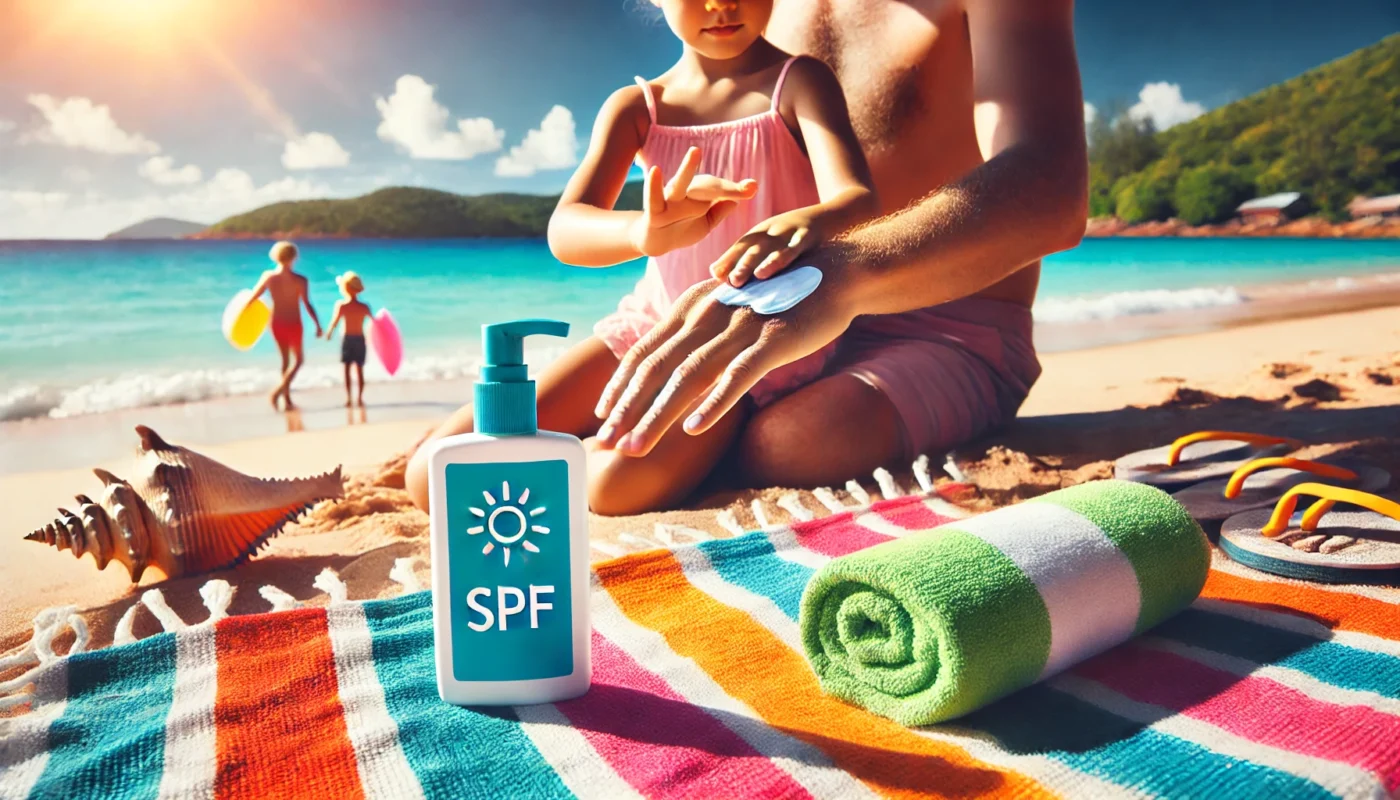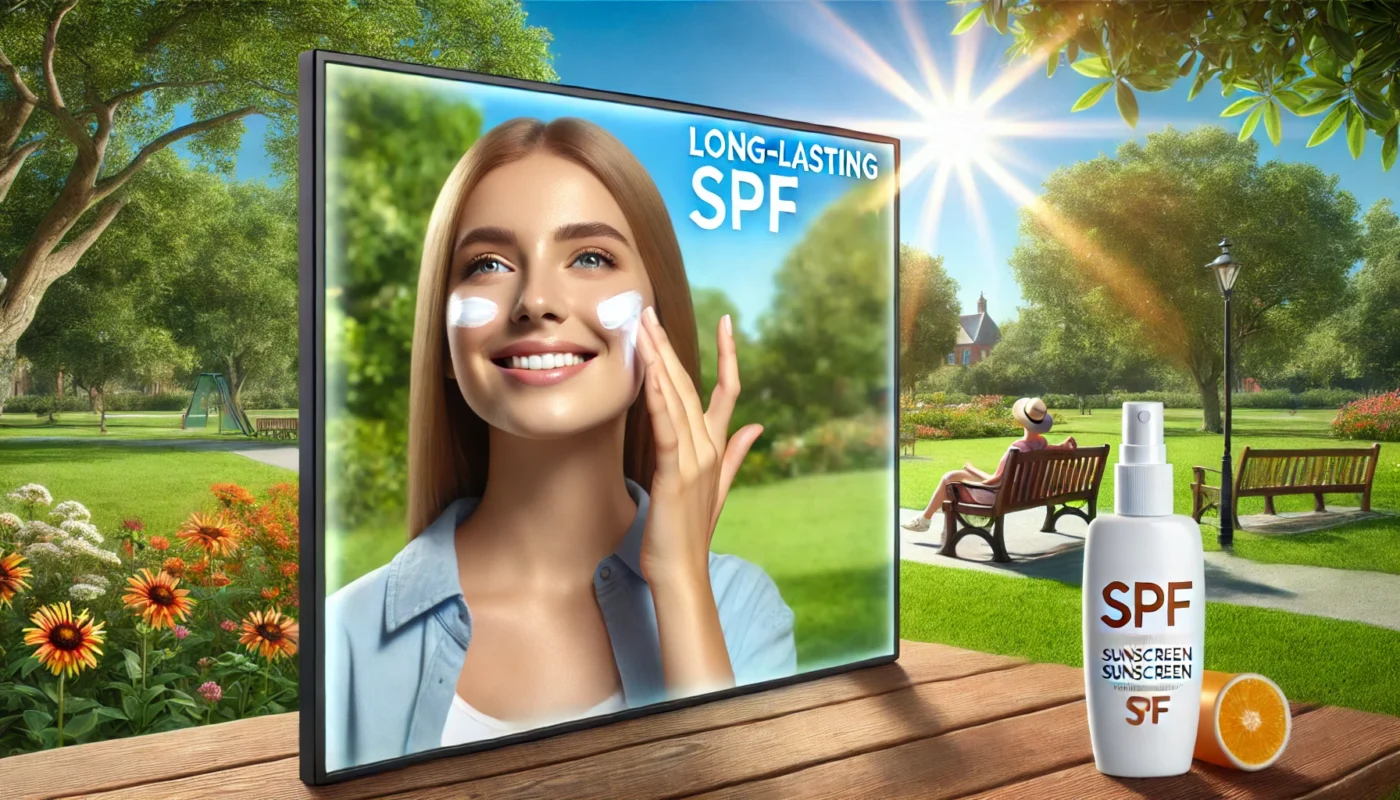When it comes to safeguarding your skin from the sun’s harmful rays, choosing the right sunscreen is crucial. But with so many options available, is there a sunscreen that lasts all day? In this comprehensive guide, we’ll delve into the intricacies of sun protection, explore the science behind SPF, and offer practical advice for selecting a sunscreen that provides long-lasting protection.
You may also like: Essential Summer Skin Care Tips
Understanding SPF and Its Importance
What is SPF?
SPF, or Sun Protection Factor, is a measure of how well a sunscreen can protect skin from UVB rays, the kind of radiation that causes sunburn and contributes to skin cancer. SPF is a relative measure, indicating how much longer you can stay in the sun without burning compared to unprotected skin.
For example, if you would normally burn in 10 minutes without protection, an SPF 30 product should theoretically allow you to stay in the sun 30 times longer, or 300 minutes, without burning. However, this is an ideal scenario, and various factors can affect actual protection. These factors include the amount of sunscreen applied, the individual’s skin type, and environmental conditions, which can all alter the effectiveness of the SPF rating.
How Does SPF Work?
SPF works by absorbing, reflecting, or scattering sunlight, thereby protecting the skin from harmful UV radiation. The ingredients in sunscreen form a barrier on the skin’s surface, which reduces the penetration of UV rays. Chemical sunscreens absorb UV radiation and convert it into heat, while physical sunscreens act as a shield, reflecting UV rays away from the skin. The effectiveness of SPF is also influenced by the formulation of the sunscreen and the presence of additional ingredients, such as antioxidants.
Why is Long-Lasting SPF Important?
Long-lasting SPF ensures that your skin remains protected throughout the day, reducing the need for frequent reapplication. This is particularly beneficial for those who spend extended periods outdoors or have busy schedules that make reapplication inconvenient.
However, it is important to note that no sunscreen can provide all-day protection without the need for reapplication, as factors such as sweat, water exposure, and physical activity can diminish its effectiveness. Long-lasting formulations can help extend the protection period, but they should still be reapplied every two hours for optimal protection, especially after swimming or excessive sweating.
The Science Behind Sunscreen Formulations
Chemical vs. Physical Sunscreens
Sunscreens are generally classified into two categories: chemical and physical. Chemical sunscreens absorb UV radiation and transform it into heat, which is then released from the skin. Common ingredients include oxybenzone, avobenzone, and octisalate. These sunscreens are typically easier to apply and less visible on the skin, making them a popular choice for everyday use.
Physical sunscreens, on the other hand, act like a shield, sitting on the skin’s surface and reflecting UV rays. They typically contain zinc oxide or titanium dioxide. These formulations are often preferred for their broad-spectrum protection and are less likely to cause skin irritation. Physical sunscreens are particularly beneficial for sensitive skin, as they are less likely to cause allergic reactions and provide immediate protection upon application.
Ingredients for Enhanced Longevity
For those seeking a sunscreen that lasts longer, certain ingredients can enhance the product’s staying power. Water-resistant formulas are particularly effective, as they are designed to remain effective even after exposure to water or sweat. Ingredients like octocrylene and polymers help form a film on the skin, enhancing water resistance and preventing the sunscreen from washing away easily.

Additionally, sunscreens with added antioxidants can provide extra protection against free radical damage, which occurs when skin is exposed to UV radiation. Antioxidants such as vitamin C, vitamin E, and green tea extract help neutralize free radicals, reducing oxidative stress and supporting skin health. These ingredients can also enhance the sunscreen’s efficacy and extend the duration of protection.
Innovations in Sunscreen Technology
Recent advancements in sunscreen technology have led to the development of formulations that offer improved performance and convenience. Encapsulation technology allows active ingredients to be delivered more effectively, enhancing their stability and prolonging protection. Micronized particles in physical sunscreens reduce the white cast often associated with these products, making them more aesthetically pleasing.
Moreover, the incorporation of skin-nourishing ingredients, such as hyaluronic acid and ceramides, in sunscreen formulations helps maintain skin hydration and barrier function. These innovations provide consumers with a wide range of options that cater to various skin types and preferences, ensuring effective sun protection without compromising on comfort.
Practical Tips for Choosing a Long-Lasting Sunscreen
Consider Your Skin Type
When selecting a sunscreen, it is essential to consider your skin type. Individuals with oily skin may benefit from oil-free or mattifying formulations, which help control excess shine and prevent breakouts. Look for sunscreens labeled as “non-comedogenic” to avoid clogging pores.
Those with dry skin may prefer moisturizing sunscreens with added hydrating ingredients, such as glycerin or hyaluronic acid, to maintain skin moisture levels. Sensitive skin types should opt for fragrance-free and hypoallergenic formulas to minimize the risk of irritation. Choosing the right formulation for your skin type ensures comfort and enhances the likelihood of consistent use.
Look for Broad-Spectrum Protection
Broad-spectrum sunscreens protect against both UVA and UVB rays. UVA rays penetrate the skin more deeply and are associated with aging, while UVB rays are responsible for sunburn. A broad-spectrum product ensures comprehensive protection.
When selecting a sunscreen, check the label for “broad-spectrum” coverage to ensure you are shielded from both types of UV radiation. Broad-spectrum sunscreens often contain a combination of active ingredients to provide balanced protection. This comprehensive approach helps prevent premature aging, reduces the risk of skin cancer, and maintains overall skin health.
Opt for High SPF Ratings
While no sunscreen can offer complete protection, opting for a higher SPF can provide additional security. An SPF of 30 or higher is generally recommended for extended outdoor activities. Higher SPF ratings offer increased protection, particularly for individuals with fair skin or those spending significant time in intense sunlight.
However, it is important to note that SPF ratings above 50 provide only marginally better protection. The key to effective sun protection lies in proper application and reapplication, regardless of the SPF rating. Applying a sufficient amount of sunscreen and ensuring even coverage is crucial for achieving the labeled SPF protection.
Reapply Regularly
Despite the appeal of an all-day sunscreen, reapplication is crucial. Most dermatologists recommend reapplying every two hours, or more frequently if swimming or sweating. Factors such as water exposure, perspiration, and physical activity can diminish the effectiveness of sunscreen, necessitating regular reapplication.
Consider carrying a travel-sized sunscreen for convenience, allowing you to reapply as needed throughout the day. For added protection, wear protective clothing, hats, and sunglasses, and seek shade during peak sun hours. Combining these measures with regular sunscreen application enhances your overall sun protection strategy.
Assess the Sunscreen’s Texture and Finish
The texture and finish of a sunscreen can influence your willingness to use it consistently. Lightweight, non-greasy formulas are ideal for everyday wear, especially for those who apply makeup on top. Gel-based sunscreens are often favored for their quick absorption and matte finish, making them suitable for oily or combination skin.
Cream or lotion-based sunscreens offer a more hydrating feel, benefiting those with dry or mature skin. Additionally, consider trying tinted sunscreens, which provide subtle coverage and even out skin tone while offering sun protection. Selecting a sunscreen with a texture and finish that you enjoy ensures regular application and optimal protection.
The Role of Lifestyle and Environment
Environmental Factors
Consider the environment in which you spend most of your time. High altitudes, reflective surfaces like water and sand, and geographical locations closer to the equator can increase UV exposure, necessitating more frequent sunscreen application. In such environments, UV radiation intensity is heightened, increasing the risk of sunburn and skin damage.
Additionally, seasonal variations can influence UV levels, with higher exposure during summer months. Understanding these environmental factors allows you to tailor your sun protection strategy, ensuring adequate coverage and minimizing the potential for sun damage.
Lifestyle Considerations
Your daily activities also play a role in sunscreen selection. For instance, if you engage in water sports, opt for a water-resistant sunscreen. Water-resistant formulations are designed to withstand moisture, providing extended protection during aquatic activities or heavy sweating.
If you spend time in urban settings, a non-greasy, lightweight formula may be more suitable. Urban environments often require a sunscreen that offers both sun protection and pollution defense, as exposure to pollutants can exacerbate skin damage. Look for sunscreens with added antioxidants to combat environmental stressors and maintain skin health.
Travel and Outdoor Activities
When traveling, especially to sun-intensive destinations, it is crucial to pack a reliable sunscreen. Consider the climate and UV index of your travel destination to determine the appropriate SPF and formulation. For outdoor enthusiasts, such as hikers and campers, portable sunscreen options, such as sticks or sprays, offer convenience and easy application on the go.
Remember to reapply sunscreen during long outdoor excursions, even on cloudy days, as UV rays can penetrate through clouds. By adapting your sun protection routine to your travel and outdoor activities, you can enjoy your adventures while safeguarding your skin.
Assessing Your Daily Sun Exposure
Understanding your daily sun exposure is essential for selecting the right sunscreen. Consider your typical outdoor activities, such as commuting, exercising, or gardening, and evaluate how much time you spend in direct sunlight. If you have a high level of sun exposure, prioritize sunscreens with higher SPF ratings and long-lasting formulations.

Additionally, assess your indoor environments, as UV rays can penetrate windows and cause skin damage over time. Applying sunscreen daily, even indoors, helps maintain consistent protection and prevents cumulative sun damage.
Popular Long-Lasting Sunscreen Products
While no sunscreen can truly last all day without reapplication, certain products stand out for their longevity and effectiveness. Here are a few recommended options:
- La Roche-Posay Anthelios Melt-in Milk Sunscreen SPF 100: Known for its high SPF and water resistance, this sunscreen is ideal for prolonged outdoor activities. Its lightweight texture allows for easy application, and it offers broad-spectrum protection, making it a favorite for outdoor enthusiasts.
- Neutrogena Hydro Boost Water Gel Lotion SPF 50: This lightweight, hydrating sunscreen is perfect for daily use and offers broad-spectrum protection. Infused with hyaluronic acid, it helps maintain skin moisture, making it suitable for those with dry or dehydrated skin.
- EltaMD UV Clear Broad-Spectrum SPF 46: Formulated with niacinamide, this sunscreen is suitable for sensitive skin and provides excellent broad-spectrum protection. Its calming properties make it an excellent choice for acne-prone or rosacea-prone skin, delivering sun protection without irritation.
- Supergoop! Unseen Sunscreen SPF 40: This unique gel-based formula offers a velvety finish and acts as a primer under makeup. Its invisible texture makes it ideal for all skin tones, providing a smooth base for daily wear.
- Australian Gold Botanical Sunscreen SPF 50: With a non-greasy, matte finish, this mineral sunscreen is perfect for oily or combination skin. It contains natural botanicals that nourish the skin while providing effective sun protection, making it a versatile choice for various skin types.
Conclusion
Choosing the right sunscreen is vital for maintaining healthy skin and preventing sun damage. While no product can offer all-day protection without reapplication, understanding the science behind SPF and selecting a high-quality, broad-spectrum sunscreen can significantly enhance your sun protection strategy.
By considering factors such as skin type, lifestyle, and environmental exposure, you can make informed decisions about the sunscreen that best suits your needs, ensuring that your skin remains protected throughout the day. Remember, the best sunscreen is the one you’ll actually use consistently. Prioritize reapplication and complement your sunscreen with other protective measures like wearing hats and seeking shade during peak sun hours.

With the right approach, you can enjoy the outdoors while safeguarding your skin against the sun’s harmful effects. Embrace the habit of daily sunscreen use, and incorporate it into your skincare routine for long-term skin health. Stay informed about new sunscreen innovations and formulations to continually optimize your sun protection strategy and maintain a radiant, healthy complexion year-round.
Further Reading
The U.S. Sun: TANTASTIC Do ‘once-a-day’ sun creams really last all day? Our face scanner test reveals all
AAD: Sunscreen FAQs
Wirecutter: The Best Sunscreens for Your Face
sunscreen, SPF, long-lasting sunscreen, sun protection, UV protection, skincare, chemical sunscreen, physical sunscreen, water-resistant sunscreen, antioxidants, healthy skin, sun safety, skin care routine, outdoor activities, daily sunscreen, skincare tips.
Important Note: The information contained in this article is for general informational purposes only, and should not be construed as health or medical advice, nor is it intended to diagnose, prevent, treat, or cure any disease or health condition. Before embarking on any diet, fitness regimen, or program of nutritional supplementation, it is advisable to consult your healthcare professional in order to determine its safety and probable efficacy in terms of your individual state of health.
Regarding Nutritional Supplements Or Other Non-Prescription Health Products: If any nutritional supplements or other non-prescription health products are mentioned in the foregoing article, any claims or statements made about them have not been evaluated by the U.S. Food and Drug Administration, and such nutritional supplements or other health products are not intended to diagnose, treat, cure, or prevent any disease.

